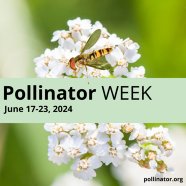 JEFFERSON CITY – This week, the U.S. Department of Agriculture (USDA) is recognizing and celebrating National Pollinator Week. Pollinator species, such as bees, other insects, birds and bats play a critical role in producing more than 100 crops grown in the United States.
JEFFERSON CITY – This week, the U.S. Department of Agriculture (USDA) is recognizing and celebrating National Pollinator Week. Pollinator species, such as bees, other insects, birds and bats play a critical role in producing more than 100 crops grown in the United States.
“Our nation’s farmers depend on a vibrant ecosystem to feed and fuel communities, and pollinators are an important part of that ecosystem,” said Agriculture Secretary Tom Vilsack. “This week and every week, it is critically important that we protect pollinators and their habitats. Healthy pollinator populations are essential to the continued success and well-being of agricultural producers, rural America and the entire U.S. economy because without them, many of our nation’s crops wouldn’t be able to produce as many fruits, nuts or vegetables.”
USDA supports the critical role pollinators play in our food system through research, data collections, diagnostic services, pollinator health monitoring, pollinator habitat enhancement programs, pollinator health grants, and financial assistance programs. As part of USDA’s commitment, USDA established a Pollinator Subcommittee earlier this year that will identify annual USDA strategic pollinator priorities and will make pollinator health-related recommendations to strengthen USDA pollinator research efforts in support of USDA’s Science and Research Strategy.
USDA is keen to understand the collective set of stressors that impact pollinators, including pests and pathogens; pollinator habitat; and climate change. This requires that we better understand pollinator needs around climate adaptation and the entire agricultural ecosystem.
Learn more about USDA pollinator work at www.usda.gov/pollinators.
